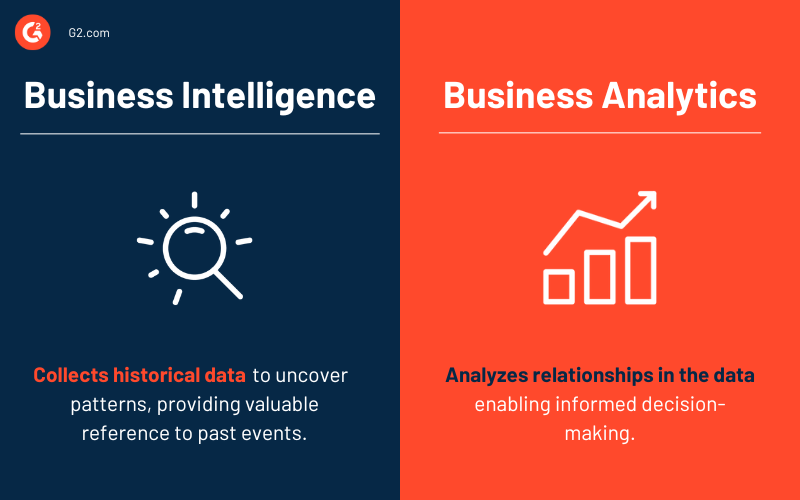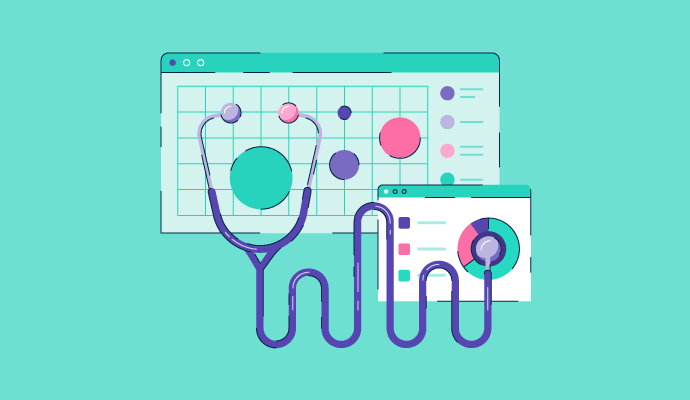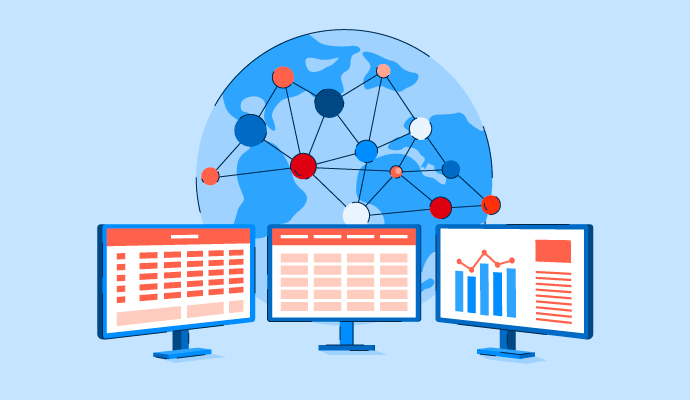In today's rapidly evolving business landscape, harnessing the power of data has emerged as a top priority.
However, it's not just about collecting data; the real value lies in effectively analyzing and leveraging it to drive informed decisions. This is where business intelligence (BI) comes into play. It integrates business analytics (BA), data mining, visualization, and cutting-edge technology to help organizations unlock valuable insights from vast amounts of data.
Within the healthcare sector, business intelligence, and data analytics help providers find opportunities to improve patient care. Organizations can use healthcare analytics software to identify improvement areas and ensure that each patient receives quality healthcare.
What is healthcare business intelligence?
Healthcare business intelligence collects and analyzes vast data from patients, hospitals, agencies, medical records, insurance claims, and billing. It empowers organizations to extract insights, identify trends, and optimize operations for cost reduction and improved patient outcomes.
In this article, we will explore the fundamentals of business Intelligence in healthcare and its importance in improving patient care.
What does business intelligence do?
Business intelligence encompasses various tools, strategies, and technologies that convert raw, unstructured data into valuable information. By leveraging the power of data, which serves as the foundation of every industry, it delivers sophisticated representations of information.
Over time, business intelligence has evolved to encompass diverse processes. These include:
- Data mining: Uncovering trends and patterns in large data sets using machine learning, databases, and statistical methods.
- Descriptive statistics: Conducting preliminary data analysis to understand what occurred in a given case study.
- Querying: Requesting data information from databases, facilitated by modern business intelligence systems that enable easy connectivity to diverse data sources.
- Statistical analysis: Consolidating and analyzing data sets to identify patterns and predict future outcomes.
- Reporting: Sharing analysis results with stakeholders enables informed decision-making based on insights derived from big data.
- Data visualization: Utilizing advanced techniques and tools to analyze large data sets and present insights through visually appealing representations such as graphs, charts, and maps.
Möchten Sie mehr über Gesundheitsanalyse-Software erfahren? Erkunden Sie Gesundheitsanalytik Produkte.
Role of business intelligence in the healthcare industry
Healthcare organizations understand the significance of timely access to comprehensive data, reporting, and decision support. Business intelligence enables hospitals, clinics, laboratories, and other healthcare institutions to effectively organize and analyze crucial data categories, including financial, operational, and clinical data.
By harnessing business intelligence, healthcare systems can make informed strategic decisions, detect diseases earlier, enhance patient treatment, and realize various other benefits that improve healthcare delivery.
This is a foundation for enhancing patient care, optimizing treatment efficiency, reducing costs, and ensuring swift accreditation of healthcare services.
Business intelligence vs. business analytics
Innovation plays a crucial role in healthcare, facilitating various processes such as appropriate staffing, reducing patient wait times, improving triage processes, and enhancing medication effectiveness.
To innovate effectively, healthcare organizations must embrace technological advancements. This involves integrating diverse data sources, ensuring data quality and security, and synergistically utilizing business intelligence and business analytics approaches.

Business intelligence focuses on extracting meaningful information from various data sources, including electronic health records, financial systems, operational databases, and external datasets. When properly analyzed, these sources provide information that can reveal trends, patterns, and correlations instrumental in optimizing healthcare processes.
In contrast, business analytics employs advanced analytical techniques, including statistical analysis, predictive modeling, data mining, and machine learning, to uncover actionable insights and accurately predict future outcomes. By understanding the "why" behind the data, healthcare organizations can better understand the factors that drive success or contribute to challenges.
Combining business intelligence and business analytics empowers healthcare organizations to make informed decisions based on the data, optimize strategies, and drive continuous improvement.
Uses of business intelligence in the healthcare industry
Incorporating business intelligence into healthcare processes presents a significant opportunity for healthcare providers to revolutionize service delivery.
Let's explore areas where business intelligence can effectively enhance processes and outcomes.
Data collection
Business intelligence can effectively gather data from reliable sources, including government agencies, research institutions, and reputable healthcare organizations, ensuring the information's accuracy and validity.
Storage of data in a single database
Business intelligence can provide a centralized database that enables easy access to authorized personnel throughout the organization. This promotes collaboration and facilitates the sharing of insights and knowledge across departments.
Analysis of available data
Given the vast amount of healthcare data generated, manual processing is impractical and time-consuming. Organizations can efficiently analyze complex datasets by leveraging business intelligence and business analytics tools and techniques like machine learning and artificial intelligence (AI). This analysis leads to valuable insights and actionable recommendations.
Report generation and predicting results
Business intelligence systems can generate comprehensive reports on key performance indicators (KPIs) across various areas of healthcare operations. These reports allow organizations to monitor and evaluate their performance, identify areas for improvement, and track progress toward strategic goals.
Business intelligence systems can also facilitate scenario modeling and predictive analytics. By analyzing historical data and current indicators, organizations can simulate different scenarios, assess the potential impact of various decisions, and make informed choices to improve patient outcomes and operational efficiency.
Identification of market trends
Business intelligence enables healthcare organizations to monitor market trends, patient preferences, and competitive landscapes. Understanding these factors helps organizations develop competitive strategies that attract and retain patients, optimize resource allocation, and enhance the quality of care.
Organizing important data
Establishing data governance processes and systems is crucial to ensure essential data is organized, correctly classified, and securely stored. This allows new employees to access and leverage existing knowledge, contributing to their onboarding process and promoting continuity in data-driven decision-making.
Examples of healthcare business intelligence
Healthcare business intelligence has numerous applications across various areas of the healthcare industry. Some examples include:
Development of clinical decision support systems
Healthcare business intelligence enables the development of clinical decision support systems that provide real-time insights to healthcare professionals.
These systems help optimize patient care by providing evidence-based recommendations, alerts for potential adverse events, and personalized treatment plans based on patient data.
Financial analytics and revenue cycle management
Healthcare organizations use business intelligence to analyze financial data, track key performance indicators, and optimize revenue cycle management.
By analyzing billing and reimbursement patterns, identifying inefficiencies, and improving revenue capture, healthcare business intelligence helps organizations enhance financial performance and sustainability.
Operational analytics and process improvement
Healthcare business intelligence supports operational analytics, allowing organizations to analyze and optimize patient flow, resource allocation, and inventory management processes.
Healthcare organizations can streamline operations, reduce costs, and enhance overall efficiency by identifying bottlenecks, inefficiencies, and areas for improvement.
Population health management and preventive care
Business intelligence plays a crucial role in population health management by analyzing large data sets to identify at-risk populations, disease patterns, and factors contributing to health outcomes.
This enables healthcare organizations to develop targeted interventions, preventive care strategies, and population health initiatives to improve health outcomes and reduce healthcare costs.
Benefits of business intelligence in healthcare
Healthcare business intelligence offers a range of benefits that contribute to improving patient care and organizational efficiency. Some key advantages include:
- Drives business growth: Business intelligence enables healthcare organizations to analyze market trends and consumer behavior to identify new business opportunities and develop strategies for growth.
- Enhances research and development: Business intelligence can analyze data on new treatments, medications, and other healthcare products, identifying opportunities for research and development and guiding decision-making in this area.
- Improves patient care: Business intelligence provides detailed patient health data by correlating various reports and medical records. This understanding allows healthcare professionals to create optimal conditions for inpatient care, plan accurate home visits, and provide more targeted and personalized care.
- Optimizes operations: Business intelligence helps analyze data on healthcare facility utilization, staffing, and other operational factors, identifying opportunities for improving efficiency and reducing costs.
- Predicts the needs of patients: Business intelligence can forecast patient needs at both micro and macro levels.
- Individualized treatment: Business intelligence collects and analyzes vast amounts of data, uncovering hidden relationships that allow doctors to tailor treatment plans according to individual patient needs.
- Improves public health: Business intelligence can analyze data on public health trends to identify patterns and trends that aid public health officials in understanding and addressing public health issues.
- Facilitates fast decision-making: Business intelligence stores internal and external patient data in a centralized system, providing easy access for different healthcare institutions. In critical cases where a doctor lacks sufficient patient information, business intelligence enables them to quickly retrieve data from other departments, facilitating timely assistance.
- Financial planning: Business intelligence combines clinical, economic, and operational data, making tracking key performance indicators and optimizing financial planning easier. It enables medical staff to assess the feasibility of specific costs and optimize calculating, invoicing, and distributing funds between departments.
Challenges of business intelligence in healthcare
While healthcare business intelligence offers numerous benefits, there are also several challenges that organizations may encounter when implementing and utilizing these systems.
Some of the key challenges include:
- Privacy and security concerns: Healthcare data is susceptible and protected by privacy laws such as the Health Insurance Portability and Accountability Act (HIPAA). Ensuring the privacy and security of patient data while collecting and analyzing it for business intelligence purposes is a critical challenge in the healthcare industry.
- Ethical considerations: The ethical use of data in healthcare analytics is essential. It involves addressing issues like informed consent, data anonymization, and the responsible use of patient information to maintain trust and integrity.
- Regulatory compliance and legal considerations: Healthcare organizations must comply with regulations, such as HIPAA in the United States or General Data Protection Regulation (GDPR) in the European Union. Adhering to these regulations while collecting, storing, and analyzing data adds complexity to healthcare business intelligence initiatives.
- Data governance and stakeholder collaboration: Healthcare data is often fragmented and owned by multiple stakeholders, including patients, healthcare service providers, pharmaceutical companies, and insurance firms. Achieving data governance and collaboration among these stakeholders is challenging but crucial for successful healthcare business intelligence.
- The complexity of healthcare data: Healthcare data is complex, with multiple data sources and intricate relationships between different data types. This complexity makes extracting meaningful insights and building accurate models for data analysis and decision making challenging.
- Lack of resources and expertise: Healthcare organizations often need more skilled analytics professionals to assess and analyze their data effectively. Professionals need to understand the importance of big data, must be able to handle and interpret it appropriately and align data-driven initiatives with strategic goals.
Future of healthcare business intelligence
To fully capitalize on the potential of healthcare business intelligence, organizations must prioritize investments in developing a skilled workforce proficient in business intelligence concepts and technologies.
$85.9 billion
is the growth projected by the global healthcare analytics market in 2027.
Source: Markets and Markets
The future of healthcare business intelligence is bright, offering exciting advancements that will shape the industry. Here's a glimpse into what lies ahead:
Advances in artificial intelligence and machine learning
Integrating artificial intelligence and machine learning technologies in healthcare business intelligence will revolutionize data analytics. AI and ML algorithms can analyze large volumes of healthcare data, identify patterns, and make predictions more accurately. These advancements will enable more effective decision-making, personalized treatment plans, and improved patient outcomes.
Real-time analytics and predictive modeling
The future of healthcare business intelligence will involve real-time analytics capabilities, allowing healthcare professionals to instantly access up-to-date information and insights.
Predictive modeling techniques will enable proactive interventions by identifying high-risk individuals or predicting disease progression. Combined with real-time analytics, it will improve patient care and support timely interventions.
Integration of data from wearables, IoT devices, and telehealth platforms
The increasing adoption of wearables, Internet of Things (IoT) devices, and telehealth platforms will generate vast amounts of healthcare data. Healthcare business intelligence will be crucial in integrating and analyzing this data to derive meaningful insights.
By combining data from various sources, healthcare organizations can gain a holistic view of a patient's health, monitor chronic conditions, and support remote patient monitoring.
Opportunities for personalized medicine
By leveraging patient data, genetic information, and clinical insights, healthcare professionals can tailor treatments and interventions to individual patients.
Business intelligence tools will assist in identifying patient subgroups, predicting treatment responses, and optimizing care plans for better outcomes.
User-friendly self-service tools
Healthcare professionals will have access to intuitive and user-friendly business intelligence tools that empower them to explore and analyze health data. This will enable real-time decision-making and enhance the overall patient experience.
Enhanced ease of use
Future business intelligence solutions will focus on simplicity and ease of use, making them accessible to a broader range of healthcare professionals. Intuitive user interfaces and simplified workflows will enable faster adoption and utilization of business intelligence capabilities.
Best healthcare analytics software
By utilizing healthcare analytics software, organizations can leverage business intelligence to enhance patient care and make data-driven decisions that drive positive outcomes.
There are many factors to consider when choosing the correct software but to be included in this category, the software must:
- Integrate diverse data sources for a unified view.
- Extract valuable insights from healthcare data.
- Provide accurate information for informed decision-making.
- Monitor and optimize healthcare processes.
- Ensure protection and regulatory compliance.
- Foster collaboration for successful implementation.
* Below are the top 5 leading healthcare analytics software solutions from G2's Summer 2023 Grid® Report. Some reviews may be edited for clarity.
1. Optum Health Care Advisor
Optum Health Care Advisor, a leading healthcare organization, utilizes advanced data, technology, and clinical expertise to simplify healthcare. It directs calls to suitable advisors and offers tailored solutions, addressing expressed and unexpressed needs of members.
What users like best:
"As a busy mom juggling work and other responsibilities, I appreciate how Optum Health Care takes care of my prescriptions by mailing them to me. It's a great convenience that saves me from stopping by the pharmacy."
- Optum Health Care Advisor Review, Chelsea C.
What users dislike:
"Optum Health Care could enhance the clarity of its plan recommendations by offering detailed comparisons that consider factors such as consumer status, income, and other relevant factors. This way, they can provide more tailored advice and help individuals choose advisors best suited to their specific needs."
- Optum Health Care Advisor Review, Tushar P.
2. HealthStream Checklist
HealthStream Checklist is designed to revolutionize clinical practices and elevate nurse competency. With it, you can digitize and standardize procedures, eliminate paperwork, and streamline activities for enhanced efficiency and accuracy in healthcare.
What users like best:
"HealthStream Checklist is a remarkable tool that simplifies healthcare professionals' daily workflows by offering a comprehensive and customizable checklist solution. I particularly value its user-friendly interface, making it easy to navigate and create customized checklists that cater to specific needs. I recommend it to healthcare organizations aiming to streamline compliance processes and enhance patient safety and care quality. Its user-friendly interface, real-time tracking and reporting, and customization capabilities make it an excellent choice for any healthcare setting."
- HealthStream Checklist Review, Vishal G.
What users dislike:
"Some users may find the complexity of HealthStream Checklist overwhelming and challenging to navigate, especially for those who are not technologically savvy. There have also been minor technical issues, such as slow loading times."
- HealthStream Checklist Review, Lalo M.
3. Virgin Pulse
Virgin Pulse is a game-changing employee health and well-being solution. It empowers individuals to make sustainable behavior changes through daily engagement tools, personalized micro-learning, and targeted communications. Experience happier, healthier employees, and higher-performing organizations with our transformative software.
What users like best:
"Thanks to Virgin Pulse, smartphone integration makes monitoring our physical activities like steps and calories effortless. We can establish fitness goals, improve sleeping habits, and even manage our eating habits more effectively."
- Virgin Pulse Review, Rahul R.
What users dislike:
"Occasionally, the Virgin Pulse app experiences crashes upon opening, requiring multiple attempts to access it successfully. Additionally, there are some issues with the sync function, specifically with Google Fit, which may require disconnecting and reconnecting to ensure proper synchronization."
- Virgin Pulse Review, Anmol L.
4. Oracle Enterprise Healthcare Analytics
Oracle Enterprise Healthcare Analytics is a game-changer, utilizing disruptive technologies and outcome metrics crucial for organizational success in the healthcare industry. Empowered by advanced analytics, this cutting-edge solution revolutionizes healthcare data management and analysis, enabling healthcare organizations to make informed decisions and achieve optimal outcomes.
What users like best:
"Implementing this program has been instrumental in streamlining patient information, allowing my colleagues and me to prioritize patient care rather than spending excessive time inputting data into our system. Overall, it's an excellent system that greatly benefits our workflow."
- Oracle Enterprise Healthcare Analytics Review, Brad J.
What users dislike:
"The company could enhance the customer-centricity of their detailed summary report of the analytics model by incorporating prompt-based text summarization. This approach would help deliver more focused and personalized insights tailored to the specific needs and interests of the customers."
- Oracle Enterprise Healthcare Analytics Review, Naman V.
5. Clarify Health
Clarify Health is a leading enterprise analytics platform transforming healthcare data into actionable insights. It empowers health systems, ACOs, health plans, and life sciences companies to optimize care delivery, manage population risk, and enhance value-based care performance. It provides comprehensive analytics and longitudinal insights at an unprecedented scale, enabling informed decision-making and driving success in the healthcare industry.
What users like best:
"The team at Clarify Health has remarkable expertise and experience, ensuring that their products are usable and truly valuable for the intended audience. It is rare to find such a comprehensive understanding of the clinical, financial, and operational information required for success in value-based care. This deep understanding sets Clarify Health apart from many other companies in the same space, as they possess the full scope of knowledge needed to create genuinely useful and impactful tools."
- Clarify Health Review, Lisa W.
What users dislike:
"The learning curve for understanding the detailed elements, including claim types, diagnose-related-groups (DRGs), and more, can be challenging without expertise in the field."
- Clarify Health Review, Jessica C.
Business intelligence keeps the healthcare industry fit
Data-driven business intelligence has the potential to revolutionize healthcare by improving performance, outcomes, and revenue for providers. Business intelligence tools enable organizations to translate raw data into actionable insights, driving positive change. These tools empower healthcare professionals to make informed decisions, access real-time data, track patient progress, and proactively intervene.
Continuous innovation in business intelligence aligns with patient interests, promoting healthier outcomes and cost-effective care. Embracing business intelligence and healthcare analytics software helps unlock the full potential of data, leading to improved patient outcomes, operational efficiency, and a patient-centric healthcare system.
It’s clear that business intelligence helps collect and organize valuable health information. Learn more about the role of electronic data capture in managing clinical trial data for improved outcomes.

Devyani Mehta
Devyani Mehta is a content marketing specialist at G2. She has worked with several SaaS startups in India, which has helped her gain diverse industry experience. At G2, she shares her insights on complex cybersecurity concepts like web application firewalls, RASP, and SSPM. Outside work, she enjoys traveling, cafe hopping, and volunteering in the education sector. Connect with her on LinkedIn.


